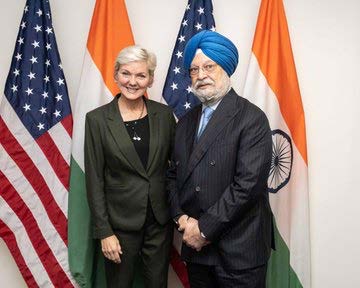Context:
Recently, the Strategic Clean Energy Partnership (SCEP) ministerial was convened by the US Energy Secretary and Minister of Petroleum and Natural Gas of India, in Washington, DC.
Key Highlight of the SECP Ministerial
- Both sides reviewed the initiatives undertaken across the five pillars under the SCEP.
- While recognizing the need to work towards a just, orderly and sustainable energy transition, which prioritizes access to reliable, affordable, and clean energy supplies, the sides welcomed the important role that energy trade plays in supporting the national priorities of both countries.
- Both sides welcomed the formal launch of the Renewable Energy Technology Action Platform (RETAP) in August 2023.
- RETAP focuses on green/clean hydrogen, wind energy, long-duration energy storage, and exploring geothermal energy, ocean/tidal energy and other emerging technologies.
- Both countries welcomed collaboration on the new National Centre for Hydrogen Safety in India.
- It is a global-oriented non-profit dedicated to promoting hydrogen safety and best practices worldwide.
- Both leaders welcomed the formal launch of the public-private Energy Storage Task Force to address policy and regulatory frameworks, safety, manufacturing and supply chains, and innovative business models.
- The two countries agreed to give an impetus to sustainable aviation fuel and in this context, they welcomed the new engagement on sustainable aviation fuels (SAF) with an inaugural SAF workshop to support training on R&D, tax incentives, and supply chain capacity building.
- Both leaders also welcomed the development of two joint reports on SAF and biofuels under the Biofuels Task Force.
- The ministers commended the work on advanced research and development of new smart grid and energy storage technologies under the recently concluded US-India Collaborative for Smart Distribution System with Storage (UI-ASSIST) program under the U.S.-India Partnership to Advance Clean Energy-Research (PACE-R).
- Partnership to Advance Clean Energy (PACE) is the flagship program on clean energy between the U.S. and India to jointly work on a range of issues related to energy security, clean energy and climate change.
- PACE aims to drive inclusive, low-carbon growth by advancing clean energy technologies and policies.
- It brings together U.S. and Indian government and non-government stakeholders and includes three key components: Research (PACE-R), Deployment (PACE-D), and Off-Grid Energy Access (PEACE).
About India-USA SCEP
- During the Leaders’ Summit on Climate in April 2021, President Biden and Prime Minister Modi announced the launch of the U.S.-India Climate and Clean Energy Agenda 2030 Partnership, to advance shared climate and clean energy goals.
- The Agenda 2030 Partnership includes two tracks in the form of the Strategic Clean Energy Partnership (SCEP) and the Climate Action and Finance Mobilization Dialogue.
- SCEP was officially launched in September 2021. Earlier, it was established as the Strategic Energy Partnership (SEP) in 2018 and had replaced the U.S.-India Energy Dialogue, the previous intergovernmental engagement for energy cooperation.
Under the SCEP, the United States and India agreed to collaborate across five pillars:
- Power and Energy Efficiency Pillar
- Renewable Energy Pillar
- Responsible Oil and Gas Pillar
- Sustainable Growth Pillar
- Emerging Fuels Pillar

